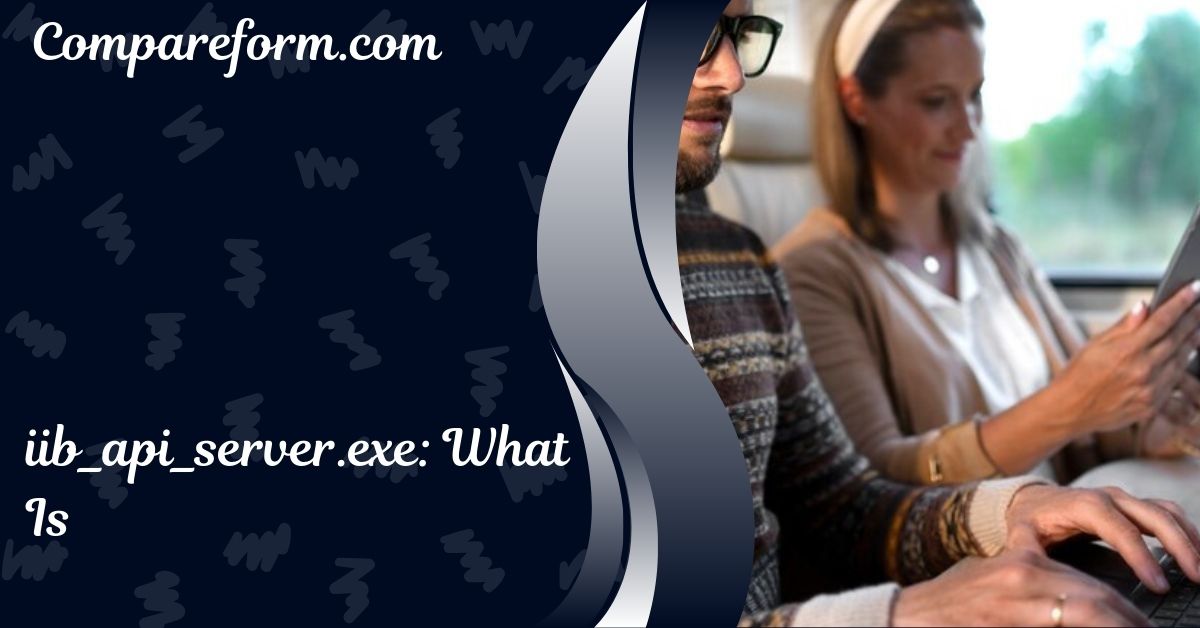iib_api_server.exe: What Is It and Why Is It Important?
In the realm of modern computing, it’s not uncommon to encounter various executable files running in the background of our systems. One such file that may catch your attention is iib_api_server.exe.
If you’ve found yourself asking, “iib_api_server.exe what is it and why is it running on my machine?” you are not alone. Many users become curious or concerned when they spot unfamiliar processes on their computers.
This article aims to provide a comprehensive understanding of iib_api_server.exe, detailing its function, significance, potential issues, and best practices for managing it.
What is iib_api_server.exe?
Definition and Overview
iib_api_server.exe is an executable file associated with IBM Integration Bus (IIB), which has been rebranded as IBM App Connect Enterprise. This software is designed to facilitate data integration and transformation across various business applications.
The executable itself is a server process that plays a crucial role in managing the communication between different software systems, enabling them to work together seamlessly.
Key Features of iib_api_server.exe
- Integration Services: At its core, iib_api_server.exe is responsible for handling integration services. It allows different applications to exchange data, ensuring that information flows smoothly between disparate systems.
- Data Transformation: The file aids in transforming data from one format to another. This is essential when different applications use various data formats, making integration complicated.
- API Management: As businesses increasingly rely on APIs for inter-application communication, iib_api_server.exe helps manage these API connections, ensuring they function effectively.
- Message Routing: The executable also plays a role in routing messages between different services and applications, making it a vital component for businesses that operate in a multi-application environment.
The Role of IBM Integration Bus (IIB)
What is IBM Integration Bus?
IBM Integration Bus (IIB) is a middleware tool designed to facilitate the integration of various applications and services across an enterprise.
It provides a platform for building, deploying, and managing integrations between systems, helping businesses streamline operations and improve efficiency.
Features of IBM Integration Bus
- Versatile Integration Capabilities: IIB supports various protocols and standards, allowing it to connect different systems regardless of their underlying technologies.
- Ease of Use: With a user-friendly interface, IIB allows developers and business analysts to create integration flows without needing extensive programming knowledge.
- Robust Security Features: Security is paramount in data integration, and IIB comes equipped with features to secure data in transit and at rest, protecting sensitive information from unauthorized access.
- Scalability: As businesses grow, their data integration needs may expand. IIB is designed to scale with the organization, accommodating increased data volumes and more complex integrations.
Understanding Why iib_api_server.exe is Running on Your Computer
Common Scenarios
You might see iib_api_server.exe running on your computer for several reasons:
- Installed IBM Integration Bus: If you or your organization has installed IBM Integration Bus, this process will naturally run in the background to facilitate integration tasks.
- Third-Party Applications: Some third-party applications that rely on IBM’s data integration capabilities may also invoke this executable as part of their functionality.
- Network Environment: If your computer is part of a larger network, especially in a corporate environment, the presence of iib_api_server.exe could be a part of the organization’s IT infrastructure to ensure data integration across various systems.
Identifying the Executable
To determine if iib_api_server.exe is genuinely associated with IBM Integration Bus, you can take the following steps:
- File Location: Check the file’s location in the system. The legitimate iib_api_server.exe should be found in a folder associated with IBM Integration Bus, typically under C:\Program Files\IBM\Integration Bus\.
- Digital Signature: Right-click the file, select “Properties,” and navigate to the “Digital Signatures” tab. If the file is signed by IBM, it is likely legitimate.
- Task Manager: Open the Task Manager, find the process, and right-click on it. Select “Open File Location” to verify the path of the executable.
Is iib_api_server.exe Safe?
Assessing Safety and Legitimacy
In general, iib_api_server.exe is a safe and legitimate file, especially when it comes from a trusted source like IBM. However, like any executable file, it can be targeted by malware or could be impersonated by malicious software.
Signs of Malicious Activity
- Unusual Location: If you find iib_api_server.exe outside its typical installation directory, it may be a sign of malicious activity.
- Absence of Digital Signature: A lack of a proper digital signature or an invalid signature can indicate that the file is not genuine.
- High Resource Consumption: If the executable is consuming an excessive amount of CPU or memory without a clear reason, this could warrant further investigation.
Steps to Ensure Safety
- Regular Scans: Use reputable antivirus or anti-malware software to perform regular scans of your system to detect and remove any potential threats.
- Update Software: Keep your IBM Integration Bus software updated to the latest version to ensure that any known vulnerabilities are patched.
- Monitor Processes: Regularly check your Task Manager for any unusual or unknown processes. If you spot something suspicious, investigate further.
Common Issues Associated with iib_api_server.exe
High CPU or Memory Usage
One of the most common complaints from users is that iib_api_server.exe may consume a significant amount of system resources. Here are some steps to troubleshoot this issue:
- Restart the Process: If you notice high CPU usage, consider restarting the process via the Task Manager. Sometimes, simply ending the task and allowing it to restart can resolve the issue.
- Software Updates: Check for updates to IBM Integration Bus. Performance improvements and bug fixes are often included in software updates.
- Configuration Review: A misconfiguration in your integration flows or processes could lead to inefficiencies. Review your integration settings to ensure they are optimized.
Crashes and Unresponsiveness
If iib_api_server.exe frequently crashes or becomes unresponsive, it could indicate an underlying issue. Here are some troubleshooting steps:
- Check Logs: Examine the logs generated by IBM Integration Bus to identify any errors or warnings that could explain the crashes.
- Reinstall Software: If the problem persists, consider uninstalling and reinstalling IBM Integration Bus. Corrupted files can sometimes cause executable files to behave improperly.
- Consult IT Support: If you are in a corporate environment, consult your IT department for assistance. They may have specific insights into configuration or performance issues.
Managing iib_api_server.exe: Best Practices
When to Keep iib_api_server.exe Running
If your organization relies on IBM Integration Bus for data integration, it’s essential to keep iib_api_server.exe running to ensure seamless data flow. Here are scenarios when you should allow it to operate:
- Active Integrations: If you have active integration flows that require data exchange between applications, the executable needs to be operational.
- Scheduled Tasks: If you rely on scheduled tasks that depend on data integration, disabling iib_api_server.exe could disrupt those processes.
- Development Environment: In a development or testing environment where integrations are being developed or tested, it’s necessary to have the process running for testing purposes.
When to Disable or Remove iib_api_server.exe
If you determine that your organization no longer requires IBM Integration Bus, or if you are an individual user without any need for data integration, you may consider disabling or removing it.
- No Longer Using the Software: If you have uninstalled IBM Integration Bus and are certain you no longer need it, you can safely remove iib_api_server.exe.
- Resource Management: If you’re experiencing significant performance issues and do not use the software, disabling the process may help improve system performance.
- Security Concerns: If you suspect that iib_api_server.exe is compromised or associated with malware, it is wise to remove it after ensuring that it is not a necessary part of your software stack.
Steps to Disable or Uninstall iib_api_server.exe
- Disabling the Process:
- Open Task Manager.
- Locate iib_api_server.exe in the list of processes.
- Right-click and select “End Task.”
- Uninstalling IBM Integration Bus:
- Open Control Panel.
- Navigate to “Programs and Features.”
- Locate IBM Integration Bus in the list, select it, and click “Uninstall.”
Performance Optimization with iib_api_server.exe
Enhancing System Performance
While iib_api_server.exe is essential for integration tasks, it’s crucial to ensure that it doesn’t adversely impact your system’s performance. Here are some optimization strategies:
- Monitor Resource Usage: Use tools like Task Manager or Resource Monitor to keep an eye on the CPU and memory usage of iib_api_server.exe. If it consistently consumes excessive resources, further investigation may be needed.
- Optimize Integration Flows: If you manage integration flows, regularly review and optimize them to ensure they are efficient and do not place undue strain on system resources.
- Increase System Resources: If your system frequently struggles under load, consider upgrading your RAM or CPU to handle the demands of data integration more effectively.
Regular Maintenance and Updates
- Software Updates: Regularly check for updates to IBM Integration Bus. New versions often include performance enhancements and bug fixes that can improve stability.
- System Cleanup: Perform routine system maintenance, such as disk cleanup and defragmentation (if applicable), to keep your system running smoothly.
- Regular Backups: Always maintain regular backups of critical data to prevent data loss during integration processes or system failures.
FAQs about iib_api_server.exe
Q1: What is iib_api_server.exe primarily used for?
A1: iib_api_server.exe is used primarily for data integration tasks within IBM Integration Bus. It facilitates communication and data transfer between different software applications, ensuring they work together seamlessly.
Q2: Is it safe to leave iib_api_server.exe running?
A2: In most cases, yes. If you are using IBM Integration Bus or a related application, it is safe to keep the process running. However, it’s essential to ensure that it is the legitimate executable and not a disguised malware file.
Q3: What should I do if I suspect that iib_api_server.exe is malware?
A3: If you suspect that the file is malicious, perform the following steps:
- Check its file location and digital signature.
- Run a comprehensive scan using trusted antivirus software.
- If it’s confirmed as malware, remove it and consider reinstalling the affected software.
Q4: How can I optimize the performance of iib_api_server.exe?
A4: You can optimize performance by monitoring resource usage, optimizing your integration flows, increasing system resources if needed, and ensuring your IBM Integration Bus software is updated to the latest version.
Q5: Can I uninstall iib_api_server.exe if I don’t use IBM Integration Bus?
A5: Yes, if you no longer use IBM Integration Bus or any applications that rely on it, you can safely uninstall the software, which will also remove iib_api_server.exe.
Conclusion
In conclusion, understanding what is iib_api_server.exe and its role in data integration can significantly enhance your ability to manage your computer system effectively.
While iib_api_server.exe is generally safe and essential for businesses that rely on IBM Integration Bus, being aware of its function and potential issues can help you make informed decisions about your software and system performance.






